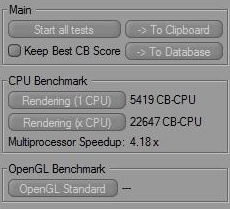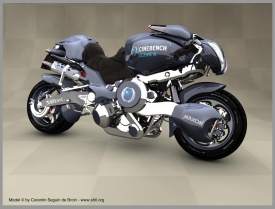Cinebench R10 64-bit
Download from: www.maxon.netCinebench R10 uses Maxon's Cinema 4D engine to render a photo-realistic scene of a shiny motorbike. The scene is highly complex, with reflections, ambient occlusion and procedural shaders so it gives a CPU a tough workout.
The test can be in run in single-threaded 1CPU mode or multi-threaded xCPU mode - just click the respective button. In this way, Cinebench R10 is useful for gauging the performance of each execution core of a CPU, as well as its overall performance.
As Cinema 4D is a real-world application - used on films such as Spider-Man, Star Wars among others - Cinebench R10 can be viewed as a real-world benchmark.
At its stock clock the Athlon II X2 250 is faster than any other stock clocked CPU at this price point. Clearly its extra frequency gives it an advantage in this test. Even when overclocked, the Athlon X2 7850 BE is barely any faster than the Athlon II X2 250, and once the latter is overclocked it trounces the more expensive Athlon processor. The same goes for the Pentium E5200 though, which outperforms every CPU when overclocked. Although the Athlon II X2 250 gives it a great run for its money, there's still several hundred points between them.

MSI MPG Velox 100R Chassis Review
October 14 2021 | 15:04











Want to comment? Please log in.